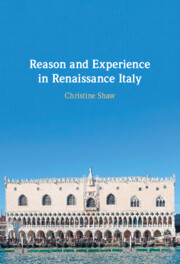Book contents
- Reason and Experience in Renaissance Italy
- Reason and Experience in Renaissance Italy
- Copyright page
- Contents
- Acknowledgements
- Abbreviations
- Introduction
- 1 Union, Faction and Political Participation
- 2 Sharing in Office, Sharing in Power
- 3 Supreme Authority and Executive Power
- 4 Public Finances and Private Interests
- 5 A Well-ordered Republic
- 6 The Legitimacy of Princely Rule
- 7 Libertà and the Community of Italian Powers
- 8 Practice and Theory
- Conclusion
- Bibliography
- Index
3 - Supreme Authority and Executive Power
Published online by Cambridge University Press: 18 November 2021
- Reason and Experience in Renaissance Italy
- Reason and Experience in Renaissance Italy
- Copyright page
- Contents
- Acknowledgements
- Abbreviations
- Introduction
- 1 Union, Faction and Political Participation
- 2 Sharing in Office, Sharing in Power
- 3 Supreme Authority and Executive Power
- 4 Public Finances and Private Interests
- 5 A Well-ordered Republic
- 6 The Legitimacy of Princely Rule
- 7 Libertà and the Community of Italian Powers
- 8 Practice and Theory
- Conclusion
- Bibliography
- Index
Summary
The locus of ultimate authority in the government of an Italian republic was always a corporate entity, a council, or the popolo or comune. When individuals at the head of the government were officially referred to as a “prince” it was an honorific title. Most commonly, it was a legislative council that was identified as the prince, a council seen as representing the political community, as exercising authority most directly derived from it, and not one exercising supreme executive authority. If advisory councils or executive committees with special delegated powers became long-term features of government, that could be seen as encroaching on the power and prerogatives of the prince. Whatever entity was identified as the prince, it was the embodiment of a collective sovereignty, and the sense that citizens participated in the collective sovereignty raised questions of the boundaries and connections between public and private interests in the republic.
- Type
- Chapter
- Information
- Reason and Experience in Renaissance Italy , pp. 82 - 102Publisher: Cambridge University PressPrint publication year: 2021



